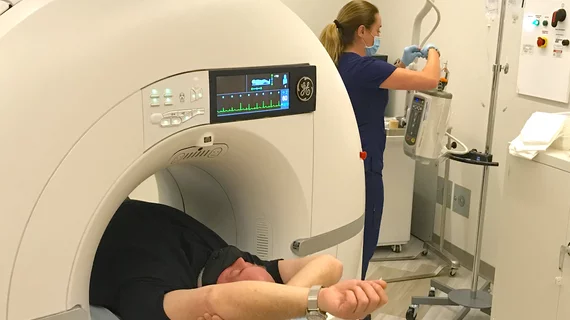Substituting iodinated contrast media in patients with a history of ICM reactions reduces risk by 61%
A new meta-analysis provided supporting evidence that changing the iodinated contrast media used in patients who require repetitive contrast-enhanced exams could reduce the risk of hypersensitivity reactions.
The results of the analysis, which included more than 7,000 case reports, were published July 19 in Radiology.
“Due to the frequency of ICM administration, hypersensitivity reactions—even rare, life-threatening reactions—commonly occur in radiology practices,” corresponding author Teruhiko Terasawa, of the Department of Emergency and General Internal Medicine at Fujita Health University in Japan, and colleagues wrote. “For patients with a prior ICM-induced hypersensitivity reaction, health care providers must balance the benefit of ICM reuse against the risk of a repeat reaction.”
Sample Size Matters
The experts discussed prior studies on the topic, but shared that most research lacked sufficient sample sizes to be conclusive—something they wanted to avoid in their own work. This new analysis was comprised of six retrospective observational studies. These combined resulted in a total of 7,155 cases of patients with a history of hypersensitivity reactions to low-osmolality iodinated contrast media who underwent multiple contrast-enhanced exams. The patients were divided into two groups—one who had an ICM-change (4,329) and one who did not (2,826).
Experts reported the group who had an ICM substitution had a 61% reduced risk for recurrent hypersensitivity reactions. Recurrent reactions were observed in 10% of the ICM-change group and 23% in the no-change group. This risk reduction was consistent across numerous sensitivity analyses.
Of note, there were not enough severe adverse events in either group to statistically conclude that switching ICM reduces the risk of severe recurrent hypersensitivity reactions.
“Given the consistently observed, large, relative benefit of ICM switching (on average, approximately 60% reduction in recurrent ICM hypersensitivity reaction) and apparent absence of unexpected adverse events from this approach, our observational data support the guideline-recommended routine implementation of ICM change in patients with a prior hypersensitivity reaction,” the experts wrote.
They went on to suggest that implementing the practice of ICM substitutions requires a standardized recording system that contains detailed documentation of patients’ ICM exposure and reactions to be in place. They also indicated that further research is required to establish which alternatives are best for specific situations and whether a pre-medication regimen would complement the substitution.
The study abstract can be viewed in Radiology.

